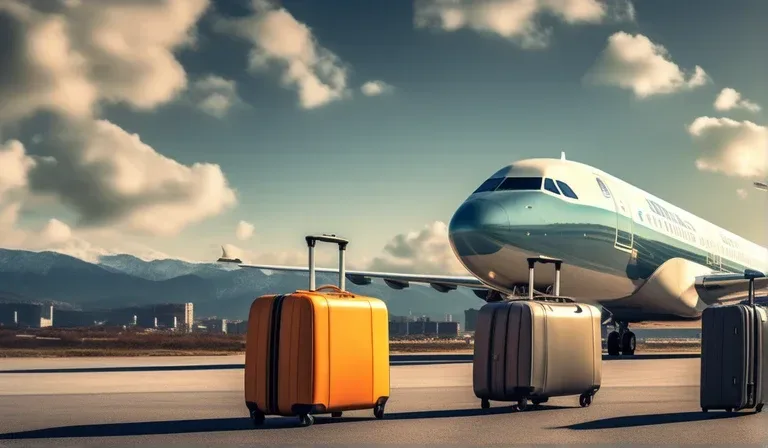Solving Travel Mysteries: Answers to Frequently Asked Questions
Welcome to ‘Solving Travel Mysteries: Answers to Frequently Asked Questions.’ This comprehensive guide aims to unravel the secrets and provide clarity to common travel queries. Whether you’re a seasoned traveler or new to the experience, understanding the intricacies of the travel industry can be daunting.
In this guide, we will shed light on often perplexing topics such as:
- Airline codes
- Hotel room numbers
- Travel insurance
- Airport security procedures
- Flight delays
- Lost luggage
- Hidden travel fees
- Foreign currency exchange rates
By using a professional writing style and language that promotes understanding, we strive to provide you with the knowledge and tools necessary to navigate the world of travel with confidence and ease.
So, let’s embark on this journey together and demystify the travel mysteries that have puzzled us for far too long.
Key Takeaways
- Decoding airline codes can help in understanding which airline you will be flying with.
- Understanding the meaning behind hotel room numbers can help guests navigate the hotel more easily.
- Room numbers often hold valuable information for guests.
- Understanding the exclusions of travel insurance coverage is crucial.
Decoding Airline Codes
In the realm of air travel, decoding airline codes can be a perplexing task for many travelers. These two-letter codes, also known as IATA codes, are assigned to each airline for identification purposes. They are used in flight itineraries, boarding passes, and baggage tags.
While they may seem like a random combination of letters, there is actually a method to the madness. The first letter of the code typically represents the country in which the airline is based. For example, ‘AA’ represents American Airlines, while ‘BA’ represents British Airways. The second letter is usually derived from the airline’s name or initials.
Decoding these airline codes can be helpful in understanding which airline you will be flying with and can assist in ensuring a smooth travel experience.
Unveiling Hotel Room Number Secrets
When it comes to hotel room numbers, there is often more than meets the eye. The meaning behind room numbers can vary from hotel to hotel, with some numbers holding hidden messages or symbolic significance.
Additionally, there are room numbering conventions that hotels follow, which can provide insight into the layout and organization of the property.
Let’s explore the secrets behind hotel room numbers and uncover the fascinating world behind their numerical codes.
Meaning Behind Room Numbers
Hotel room numbers hold hidden meanings that offer insights into the hotel’s layout and organization. While it may seem like a random sequence of numbers, each room number is carefully assigned to convey information about the room’s location and amenities.
In many hotels, the room numbers are structured to indicate the floor level and the position of the room relative to other rooms on the same floor. For example, a room with the number 401 would typically be located on the fourth floor and be the first room on the right.
Additionally, some hotels use specific numbers or patterns to indicate room types or special features, such as rooms ending in even numbers for non-smoking rooms or rooms with double digits for suites.
Understanding the meaning behind hotel room numbers can help guests navigate the hotel more easily and ensure they get the room that suits their needs.
Hidden Messages in Numbers
Hotel room numbers contain hidden messages that reveal secrets about the hotel’s layout, organization, and amenities. These seemingly random numbers often hold valuable information for guests.
For example, odd numbers might indicate rooms on one side of the hotel, while even numbers could signify rooms on the opposite side. Additionally, the first digit of the room number may indicate the floor level, allowing guests to quickly determine their location within the building.
Furthermore, some hotels use specific numbers to designate room types or special features. For instance, rooms ending in 01 could signify a suite, while rooms ending in 50 might indicate an accessible room.
Room Numbering Conventions
Room numbering conventions play a crucial role in unveiling the hidden secrets behind hotel room numbers. Understanding these conventions can provide valuable insights into the layout and organization of a hotel. Here are three fascinating facts about room numbering conventions:
- Odd and even numbers: In many hotels, odd-numbered rooms are located on one side of the hallway, while even-numbered rooms are on the other side. This convention allows for easy navigation and helps guests find their rooms quickly.
- Floor numbering: In some hotels, the numbering of floors can be different from what you might expect. For example, the ground floor may be labeled as ‘1’ instead of ‘0’. This can be confusing initially, but it is done to align with cultural preferences or to avoid negative connotations associated with certain numbers.
- Room types: Hotels often use specific room number ranges to denote different room types. For instance, rooms in the 300s might be suites, while rooms in the 100s could be standard rooms. This allows guests to easily identify and locate the type of room they have booked.
Understanding these room numbering conventions can enhance your hotel experience and make navigating the property more efficient.
Now, let’s move on to demystifying travel insurance coverage.
Demystifying Travel Insurance Coverage
When it comes to travel insurance coverage, understanding the exclusions is crucial. Many travelers are unaware of what is not covered by their insurance plan, and this can lead to unexpected expenses.
In addition, choosing the right plan is essential to ensure that you have adequate coverage for your specific needs. In this section, we will demystify travel insurance coverage by explaining the common exclusions and providing tips on selecting the right plan.
Coverage Exclusions Explained
To better understand the intricacies of travel insurance coverage, it is essential to demystify the concept of coverage exclusions. While travel insurance provides important protection, it is important to be aware of the situations and circumstances that may not be covered. Here are some common coverage exclusions to keep in mind:
- Pre-existing medical conditions: Many travel insurance policies exclude coverage for pre-existing medical conditions, so it is important to read the fine print and disclose any existing health issues before purchasing a policy.
- High-risk activities: Some policies may exclude coverage for injuries or accidents that occur during high-risk activities such as extreme sports or dangerous hobbies.
- Travel to high-risk destinations: Certain travel insurance policies may not provide coverage for trips to countries or regions deemed high-risk due to political instability, natural disasters, or health risks.
Choosing the Right Plan
Travelers must carefully consider their options when selecting a travel insurance plan to ensure comprehensive coverage and peace of mind. With the variety of plans available, it is important to understand the different types of coverage and their limitations.
One crucial factor to consider is the level of medical coverage provided. This includes coverage for emergency medical expenses, hospital stays, and medical evacuations, should the need arise.
Additionally, travelers should evaluate trip cancellation and interruption coverage, which can protect them from financial losses due to unforeseen circumstances that may force them to cancel or cut short their trip.
Other important considerations include coverage for lost or delayed baggage, travel delays, and personal liability.
Understanding Airport Security Procedures
Amidst the hustle and bustle of modern air travel, it is essential for passengers to familiarize themselves with the intricacies of airport security procedures. Understanding these procedures not only ensures a smoother journey but also contributes to the overall safety of air travel.
To help you navigate through the security checkpoints with ease, here are some key points to keep in mind:
- Liquids and gels: All liquids, gels, and aerosols must be in containers of 3.4 ounces or less and placed in a clear, quart-sized bag.
- Electronics: Laptops, tablets, and other large electronic devices must be removed from your bag and placed in a separate bin for screening.
- Metal objects: Remove any metal objects such as keys, belts, and jewelry before going through the metal detector.
By understanding and following these security procedures, you can ensure a hassle-free experience at the airport.
Now, let’s uncover the truth behind flight delays and how to deal with them effectively.
Revealing the Truth Behind Flight Delays
Flight delays are a common occurrence that can disrupt travel plans and cause inconvenience for passengers. There are several reasons why flights get delayed, ranging from technical issues with the aircraft to weather conditions that make flying unsafe. Airlines prioritize passenger safety above all else, so if there is any concern about the aircraft’s condition or the weather conditions at the destination, flights may be delayed until it is safe to proceed.
Other factors that can contribute to flight delays include air traffic congestion, airport infrastructure problems, or operational issues within the airline. While delays can be frustrating, it is important to remember that they are often necessary to ensure the safety and well-being of passengers.
Now, let’s move on to unlocking the mystery of lost luggage.
Unlocking the Mystery of Lost Luggage
When it comes to the frustrating experience of lost luggage, understanding the reasons behind it can help travelers navigate through the mystery. Here are some possible explanations for lost luggage:
- Mishandling by airport staff: Baggage handlers may mistakenly place your luggage on the wrong flight or fail to load it onto the plane altogether.
- Transfer mishaps: If you have a connecting flight, there is a chance that your luggage may not make it onto the second plane in time.
- Tag issues: Sometimes, luggage tags get damaged or detached during the journey, making it difficult for airlines to identify and deliver your bags.
To minimize the risk of lost luggage, it is recommended to label your bags with clear contact information, use TSA-approved locks, and consider purchasing travel insurance that covers lost or delayed baggage. Additionally, it is advisable to pack essentials in your carry-on to ensure you have essential items in case your checked luggage goes missing.
Exposing Hidden Travel Fees
- An alarming number of hidden travel fees can catch unprepared travelers by surprise. While the base cost of a travel package may seem reasonable, additional fees can quickly add up, leaving travelers feeling frustrated and financially burdened. These hidden fees can range from baggage fees, seat selection charges, resort fees, and even charges for using certain amenities or services.
It is crucial for travelers to thoroughly research and understand the fine print before booking their trip to avoid any unexpected expenses.
To expose these hidden fees, travelers should carefully review the terms and conditions of their bookings, consult with travel agents or customer service representatives, and consider using comparison websites to compare prices and fees across different providers. Being proactive and informed can help travelers avoid unnecessary expenses and make more informed decisions when planning their trips.
Solving the Puzzle of Foreign Currency Exchange Rates
To tackle the next travel mystery, let’s delve into the intricacies of foreign currency exchange rates. Understanding how these rates work is essential for every traveler, as it can greatly impact the cost of their trip. Here are some key points to consider:
- Factors influencing exchange rates:
- Economic indicators: GDP, inflation, interest rates, etc.
- Political stability and geopolitical events.
- Supply and demand for a particular currency.
- Types of exchange rates:
- Spot rate: The current rate at which currencies can be exchanged.
- Forward rate: A future rate agreed upon today for a future exchange.
- Cross rate: Calculated by comparing two currencies with a third currency.
- Strategies for getting the best exchange rate:
- Monitor rates and exchange when favorable.
- Avoid exchanging currency at airports or hotels due to higher fees.
- Consider using prepaid travel cards or withdrawing cash from ATMs abroad.
Frequently Asked Questions
How Can I Find the Best Deals on Flights and Hotels?
To find the best deals on flights and hotels, it is important to conduct thorough research, compare prices across different platforms, and consider booking during off-peak seasons. Utilizing travel websites and signing up for newsletters can also provide access to exclusive discounts and promotions.
What Are Some Tips for Navigating Public Transportation in a Foreign Country?
Navigating public transportation in a foreign country can be a daunting task for travelers. However, with proper planning and research, it can become an exciting adventure. Here are some tips to make your journey smoother and more enjoyable.
Is It Safe to Travel Alone as a Solo Female Traveler?
Traveling alone as a solo female traveler can be safe with proper planning and precautions. Research your destination, stay in well-lit areas, and avoid walking alone at night. Trust your instincts and be aware of your surroundings to ensure a safe and enjoyable trip.
How Can I Avoid Getting Scammed While Traveling?
To avoid getting scammed while traveling, it is crucial to stay vigilant and informed. Research about common scams in your destination, be cautious with your personal belongings, use reputable transportation and accommodation services, and trust your instincts when something feels off.
What Are Some Essential Items to Pack for a Trip?
When preparing for a trip, it is crucial to pack essential items that will ensure a smooth and comfortable journey. These items may include clothing appropriate for the destination’s climate, toiletries, medication, travel documents, gadgets, and a first aid kit.
Conclusion
In the world of travel, there are many mysteries that often leave us feeling lost and confused. However, by decoding airline codes, unveiling hotel room number secrets, and demystifying travel insurance coverage, we can navigate these uncertainties with ease.
Understanding airport security procedures, revealing the truth behind flight delays, and unlocking the mystery of lost luggage will ensure smoother travels.
Additionally, by exposing hidden travel fees and solving the puzzle of foreign currency exchange rates, we can save ourselves from unexpected expenses.
Embrace the knowledge and embark on your next journey with confidence.





